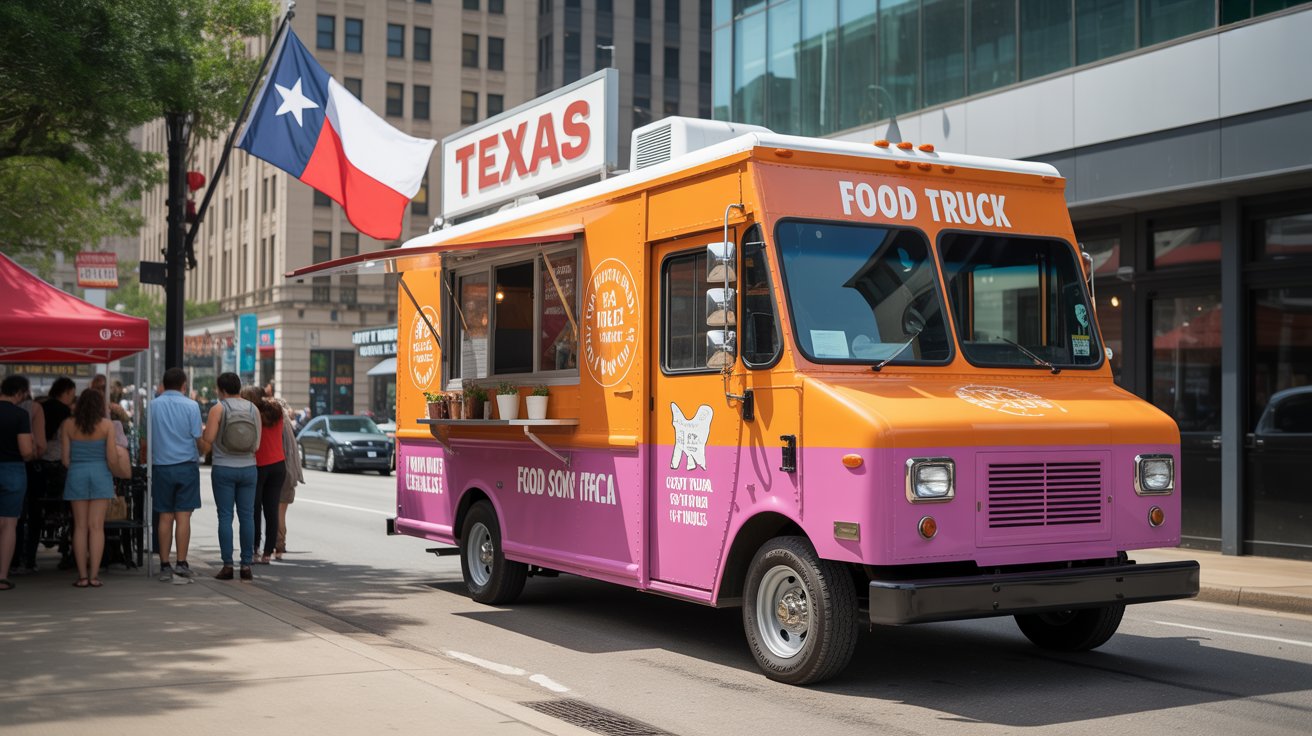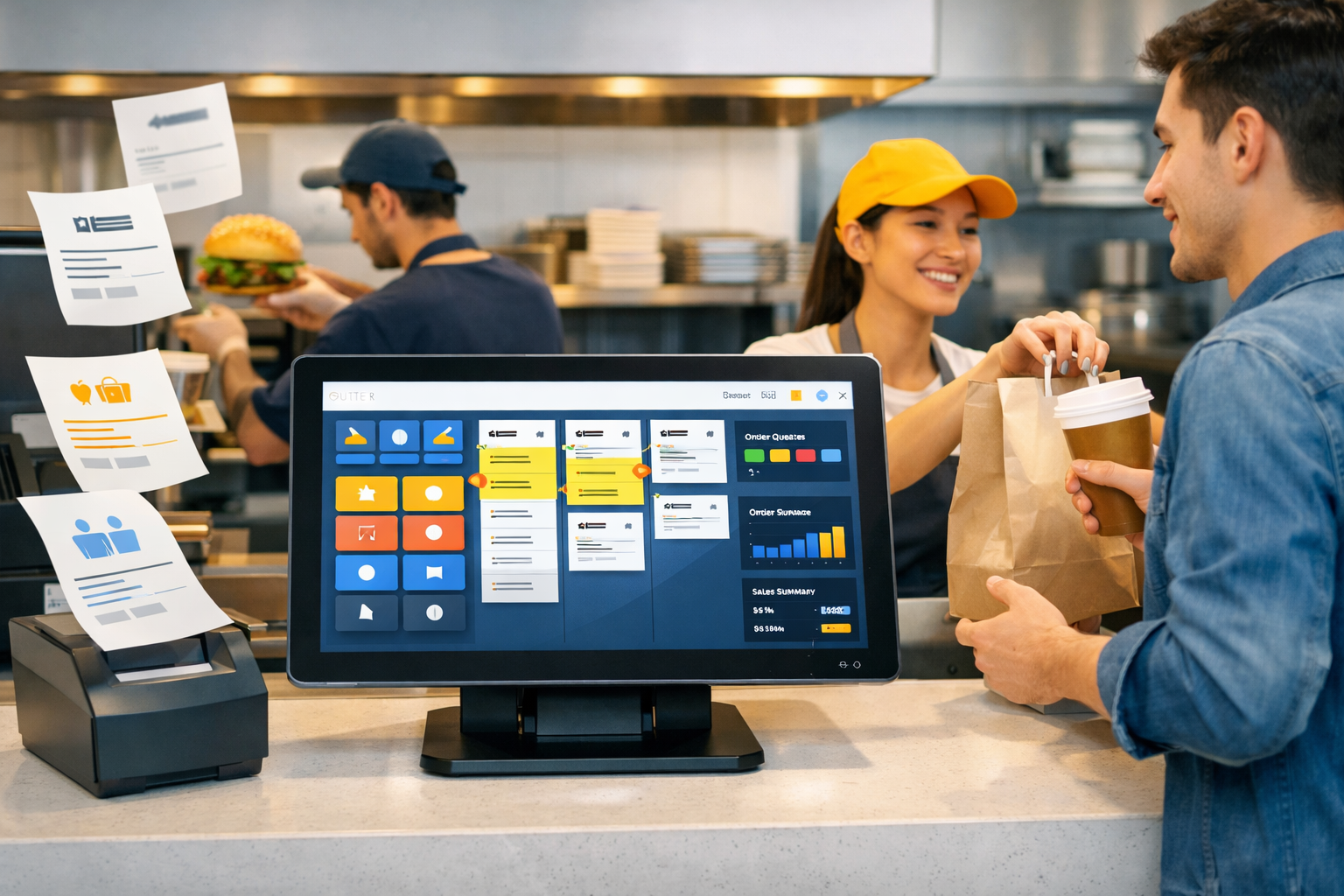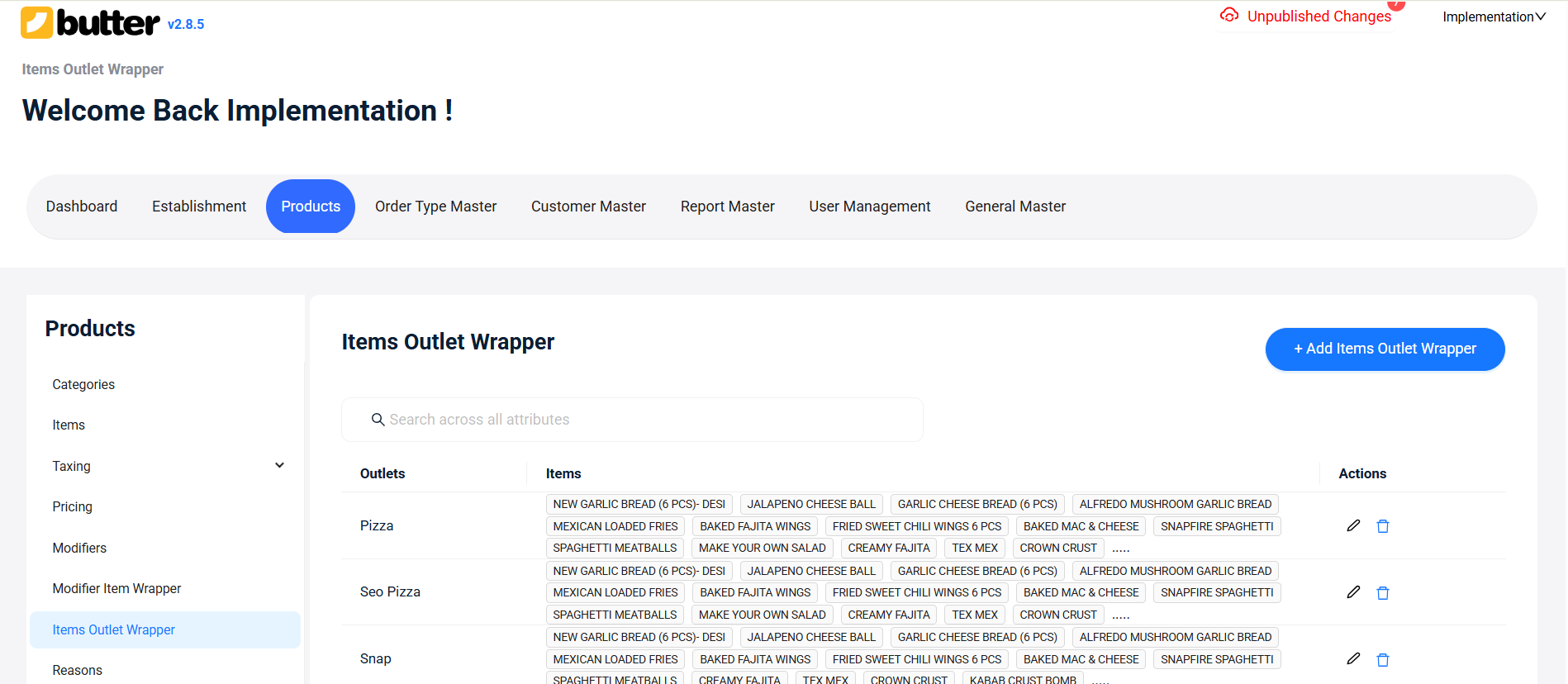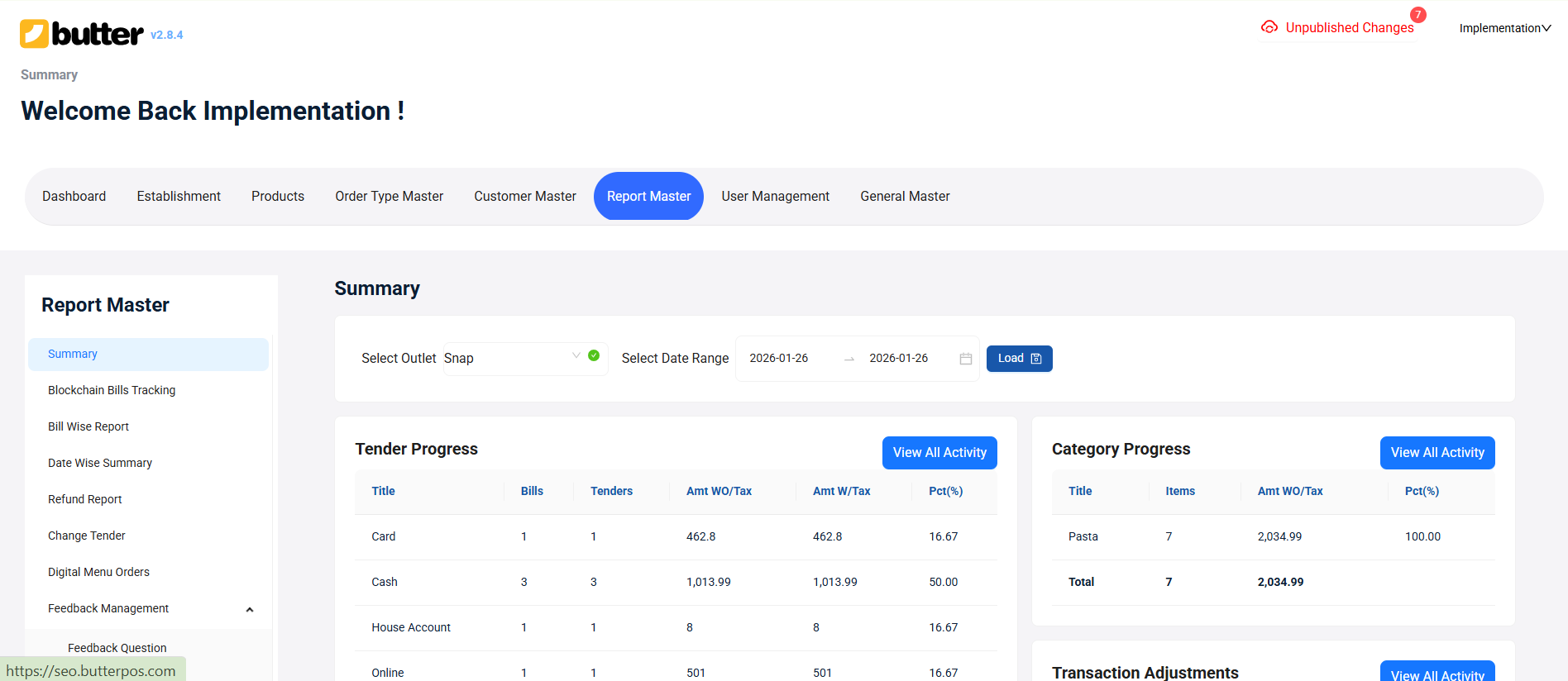So, you're dreaming of launching a food truck in Texas and honestly, it’s a great idea. Due to its buzzing food scene, lively festivals, and warm weather almost year-round, Texas is one of the best places in the U.S. to take your kitchen on wheels.
But before you fire up the grill and start serving tacos in Austin or brisket in Houston, there's a lot you need to know. We're talking about permits, licenses, health inspections, parking regulations, and state-specific laws that can make or break your food truck business.
In this guide, we’ll explore how to start a food truck business in Texas legally and successfully. From choosing the right business structure to getting your Mobile Food Unit Permit, from handling sales tax registration to finding commissary kitchens, everything you can learn in this guide.
For a visual walkthrough on starting a food truck business in Texas, check out the video below:
Why Start a Food Truck Business in Texas?
Texas isn’t just big in size but it’s big on flavor, diversity, and opportunity too. If you’re looking to enter the food business without the heavy upfront costs of a brick-and-mortar restaurant, starting a food truck in Texas is a smart move.
Here’s why:
- A massive, hungry market
- Lower startup costs compared to restaurants
- Flexible locations = more sales
- Supportive food truck communities
- A business-friendly state
Create a Solid Business Plan
Before you even start hunting for the perfect food truck or thinking about your logo design, you need to sit down and plan. A strong business plan isn’t just for investors, it’s your personal roadmap to success.
Here’s what your Texas food truck business plan should include:
Your Concept
What’s your unique twist? Texas already has thousands of taco trucks and BBQ masters, so how will you stand out?
- Will you offer vegan Tex-Mex?
- Are you fusing Southern comfort food with Asian flavors?
- Maybe you specialize in late-night comfort food near college campuses?
Pro tip: The more unique (and focused) your concept, the easier it’ll be to market.
Target Market
Who exactly are you feeding? Understanding your ideal customer will guide everything from your pricing to your parking spots.
- Busy office workers?
- Late-night foodies in downtown Dallas?
- Festival-goers in Austin?
Tailor your menu, timing, and location strategy accordingly.
Location Strategy
Since food trucks move, your "location" is your route strategy. Research:
- Popular food truck parks in Texas cities
- High-foot-traffic areas (near universities, business districts)
- Event calendars (music festivals, rodeos, fairs)
Startup Budget & Cost Breakdown
Running a food truck is cheaper than opening a restaurant, but it's still a serious investment. Here are typical costs to plan for in Texas:
| Expense | Estimated Cost Range |
| Food Truck (New/Used) | $40,000 – $120,000 |
| Equipment & Modifications | $10,000 – $30,000 |
| Permits & Licenses | $1,000 – $3,000 |
| Commissary Kitchen Rental | $500 – $1,200/month |
| Initial Food & Supplies | $2,000 – $5,000 |
| Branding & Marketing | $1,000 – $3,000 |
| Insurance | $2,000 – $5,000 annually |
Sales Forecasts & Profit Goals
Estimate:
- How many customers per day?
- What’s your average ticket size?
- How much profit after expenses?
This helps you figure out how long it will take to break even, and how fast you can grow.
Backup & Contingency Plans
What happens if your truck breaks down? Or a rainy week cuts your sales in half? Build in:
- Emergency fund planning
- Alternative operating locations
- Rental truck or shared commissary options
A business without a plan is just a wish. Your food truck might have wheels, but your business plan keeps it on track.
Choose a Business Structure
Before you can get your food truck on the road, you’ll need to legally register your business and that starts with choosing the right business structure. In Texas, the most common options for food truck owners are:
Sole Proprietorship
This is the simplest form, perfect for solo owners who want minimal paperwork. But keep in mind:
- Pros: Easy setup, fewer regulations
- Cons: You’re personally liable for any debts or legal issues
Register your Assumed Name (“Doing Business As” or DBA) with your local county clerk.
Limited Liability Company (LLC)
An LLC is a popular choice for food truck owners in Texas because it offers personal liability protection while keeping things relatively simple.
- Pros: Protects your personal assets, flexible tax options
- Cons: Slightly higher filing fees, requires annual compliance
Register your LLC through the Texas Secretary of State's website.
Partnership
If you’re teaming up with a friend or family member, you can start a general partnership, but it’s recommended to set up a partnership agreement and consider forming an LLC for added protection.
Corporation (Not Common for Food Trucks)
More complex and usually not necessary unless you plan to scale massively or seek large investments.
Do You Need an EIN?
Yes, even if you're a sole proprietor. An Employer Identification Number (EIN) is free and necessary for:
- Hiring employees
- Opening a business bank account
- Filing federal taxes
Apply online via the IRS website — it’s quick and free.
Register Your Business in Texas
Once you’ve chosen your business structure, it’s time to register your business name and file the necessary paperwork with state and local authorities. Here’s how to do it, the Texas way:
Choose and Register Your Business Name
Your food truck needs a unique name that isn’t already taken in Texas. Here's how to secure it:
- Search for name availability using the Texas SOS Direct portal.
- Register your name:
- LLCs and Corporations: File a Certificate of Formation online through the Texas Secretary of State.
- Sole Proprietors or Partnerships: Register a DBA (Doing Business As) with the county clerk’s office where your business will operate.
Pro Tip: If you’re planning to create a website or social media for your truck (which you should!), check that the domain name and social handles are also available.
Get an EIN (Employer Identification Number)
As mentioned in the last section, you’ll need an EIN from the IRS, even if you don’t have employees yet.
- Apply for free at the IRS EIN Portal.
- It takes just a few minutes, and you get your EIN immediately.
Register for State Taxes (If Applicable)
Depending on what you sell, you may need to collect sales tax in Texas.
- Most food and drinks are taxable, especially if they’re ready-to-eat.
- Register with the Texas Comptroller of Public Accounts for a Sales Tax Permit.
Apply online here: Texas Sales Tax Permit Application. It’s free, but required — and you can’t legally sell food without it.
Set Up a Business Bank Account
Now that you have your EIN and registration papers, head to a local bank and open a business checking account.
- This keeps your income, expenses, and taxes organized.
- It’s also needed if you ever apply for a loan or accept card payments.
Licenses and Permits You Need in Texas
Texas is known for its food trucks, but it's also known for being very specific when it comes to rules and health codes. If you don’t get the right licenses and permits or miss even one, your truck won’t roll an inch legally.
Let’s break down what you must have, where to get it, and how to stay compliant.
Texas Food Establishment License (Required Statewide)
This is your main food service permit, issued by the Texas Department of State Health Services (DSHS).
- Required if you prepare, handle, or serve food to the public.
- Fee ranges from $258–$773, depending on your gross annual sales.
- Valid for 2 years.
🔗 Apply through the DSHS Food Establishment Licensing page
Mobile Food Unit (MFU) Permit
Every food truck in Texas is classified as a Mobile Food Unit (MFU) and must meet specific standards:
- Must have a handwashing sink, three-compartment sink, wastewater tank, clean water tank, and hot/cold storage.
- Must be inspected and approved by your local city or county health department — each city (like Austin, Dallas, or Houston) has its own mobile unit inspection process.
- Some cities (like Austin) require a central prep facility (commissary kitchen) where you store or prep food.
Check your city’s local health department for exact MFU requirements.
Sales Tax Permit (Texas Comptroller)
We already mentioned this earlier — but it’s worth repeating: you must collect and report sales tax on most food sold from your truck.
Apply free at the Texas Comptroller’s website
Fire Marshal Inspection Certificate
If your food truck uses propane, generators, or grills, you must pass a fire safety inspection.
- Conducted by your city’s Fire Marshal’s Office
- You’ll need:
- Proper propane storage and shut-off valves
- Fire extinguisher (class K for kitchen fires)
- Hood ventilation and suppression system (if applicable)
Vehicle Registration & Commercial Insurance
Since your food truck is technically a vehicle, make sure:
- It’s registered with the Texas DMV
- You carry commercial auto insurance
- License plates and inspection stickers are current
Local Permits (City-Specific)
Each city in Texas can have its own additional rules for food trucks. Here's what to expect:
In Austin:
- Austin-Travis County MFU Application
- Commissary Letter of Agreement
- Fire Marshal inspection required
- Temporary Event Permits (if vending at events)
In Dallas:
- Dallas Retail Food Establishment Permit
- Food Manager Certification
- Fire Safety Compliance inspection
In Houston:
- Houston Health Department MFU Application
- Central Prep Facility required
- Location approval (no vending in residential areas)
Visit your city’s health department website for exact forms and fees.
Food Manager Certification
At least one person on your team must complete a Food Manager Certification course approved by the Texas DSHS.
- Available online and in-person
- Cost: Around $85–$150
- Valid for 5 years
Commissary Kitchen Agreement (If Required)
If your city mandates it (Austin and Houston do), you’ll need to sign an agreement with a licensed commissary kitchen for:
- Food prep
- Storage
- Water refills and wastewater disposal
Pro tip: Many commissaries in Texas rent space monthly for $500–$1,000 depending on access and facilities.
Quick Summary Checklist:
| Permit/License | Issued By | Required? |
| Food Establishment License | Texas DSHS | Statewide |
| Mobile Food Unit Permit | Local City/County Health Dept | City-level |
| Sales Tax Permit | Texas Comptroller | Statewide |
| Fire Marshal Inspection | Local Fire Department | If using fuel |
| Commercial Vehicle Registration | Texas DMV | Statewide |
| Food Manager Certification | DSHS-approved provider | Statewide |
| Commissary Kitchen Agreement | Private kitchen, proof required by city | City-dependent |
Buy and Equip Your Food Truck (Smartly)
Your food truck is more than just a vehicle, it’s your entire restaurant on wheels. So, choosing and equipping it wisely is one of the most important investments you’ll make.
Here’s a complete breakdown of what you’ll need to consider:
- Buy or Lease a Food Truck
- Design Your Kitchen Layout
Invest in Technology (Yes, Even in a Food Truck)
Modern food trucks aren’t just about sizzling tacos and smoky brisket — they run on tech too.
You’ll need:
- A reliable POS (Point-of-Sale) system
- Receipt printer
- Card reader/contactless payment terminal
- Menu display (optional but great for clarity and upselling)
And here’s where a good POS system can make or break your daily operations.
Why a POS System Like Butter POS Can Save You Hours of Stress
Let’s be honest, food truck life is fast-paced. You don’t have time to deal with clunky machines or complicated software. That’s why many mobile vendors across the U.S. (especially in Texas) choose Butter POS.
Here’s why it’s worth considering:
- Offline Mode: Keeps working even when Wi-Fi drops (which happens a lot on the road).
- Fast Order Taking: Quick tap interface for long lines during peak hours.
- Integrated Payments: Accept cards, Apple Pay, Google Pay — all in one spot.
- Sales Tracking & Reports: Know what’s selling, what’s not, and when you're busiest.
- Simple Setup: No IT team required. It’s plug-and-play.
If you want to focus more on food and less on managing orders, payments, and reports — Butter POS can be your co-pilot.
Want to learn more? Visit Butter POS
Budget Smart
Here’s a rough cost breakdown to help you plan:
| Item | Estimated Cost |
| Food Truck (Used or New) | $50,000–$120,00 |
| Kitchen Equipment | $10,000–$25,000 |
| Generator | $3,000–$5,000 |
| POS System (Butter POS) | Starts at $0/month |
| Design & Branding | $2,000–$5,000 |
| Licensing & Permit | $1,000–$2,500 |
Get the Right Business Insurance in Texas
Running a food truck in Texas without insurance is like cooking without fire — risky and ineffective.
Here’s what you must cover to stay legally protected and financially safe.
- General Liability Insurance
- Commercial Auto Insurance
- Property Insurance
- Workers’ Compensation (If You Have Staff)
- Business Owner’s Policy (BOP)
Where to Get Insurance?
Popular providers in Texas include:
- Progressive Commercial
- Hiscox
- Next Insurance
- CoverWallet
- State Farm (for BOP bundles)
Always compare quotes, read the fine print, and make sure your coverage matches your daily operations.
Ready to Launch Your Food Truck in Texas?
If you’ve made it this far — congrats! You’re already way ahead of most people who only dream about starting a food truck.
Let’s quickly recap what you’ve learned in this guide:
- What kind of food truck business works well in Texas
- How to research your market and pick the perfect menu
- Where to park and how to stay compliant
- All the licenses and permits you’ll need
- What to buy and how to equip your food truck
- The tech (like Butter POS) that makes running it smooth
- What insurance protects your entire setup
Already planning your food truck dream?
Don’t forget to read our complete guide on How to Start a Food Truck Business for even more details, including business planning tips and step-by-step checklists.
Frequently Asked Questions (FAQs)
What are the first steps to starting a food truck business in Texas?
Conduct market research, create a business plan, choose a legal structure, and prepare financial projections. Conducting market research on what your competitors are doing is the most crucial first step you need to take to establish your business in the industry.
Do I need a business license to operate a food truck in Texas?
Yes. You must register your business with the Texas Secretary of State and obtain a Sales Tax Permit. A business license, a Mobile Food Unit permit from your local health deparment and food handler certifications are necessary to avoid legal trouble in the future.
What permits are required for a Texas food truck?
Food establishment license, a business license, a Mobile Food Unit permit (MFU) which can be attained from your local health department and food handler certifications are necessary to operate a food truck in the State Of Texas.
Is a commissary kitchen required in Texas?
Major cities like Houston, Dallas, Austin, and San Antonio require proof of a commissary agreement during the application process, but you may be eligible for a waiver if your unit is fully self-sufficient (equipped for all prep, cleaning, and storage) and has an approved method for wastewater disposal. Checking local laws is recommended.
How much does it cost to start a food truck in Texas?
Startup costs range from $40,000 to $120,000 for the truck, equipment, permits, and insurance. The truck is easily your largest investment if you purchase it up front. Try leasing vehicles to test your business idea first.
What insurance is needed for a Texas food truck?
A commercial auto insurance (Standard personal auto insurance will not cover commercial use), a general liabiity insurance and insurances related to business protection are recommended which includes Inland Marine Insurance, Commercial Property Insurance etc.
Do I need an EIN for my food truck in Texas?
Yes, an EIN (Employer Identification Number) is needed for taxes and opening a business bank account. This can be done by applying through the IRS (Internal Revenue Service). The service is free and the fastest method is online.
Can I use a POS system in my food truck?
Yes. Mobile POS systems help track sales, manage orders, and accept payments efficiently. Even small businesses should utilize a POS if they want to keep track of their cash flow.
How do I choose where to park in Texas?
Many cities prohibit parking within 300 to 600 feet of a brick-and-mortar restaurant without notarized, written permission from those establishment owners. You must park at least 20 ft away from any street intersection and avoid blocking fire hydrants, bus stops, or crosswalks, which could otherwise lead to legal consequences.
Are food safety certifications required in Texas?
Yes. At least one staff member typically needs a certified food manager certificate so that your business can keep running without any legal hiccups.
How do I create a menu for a Texas food truck?
Keep it simple, focus on best-sellers, consider preparation time, and account for ingredient costs. Design dishes that share common ingredients. For example, a single smoked brisket can be used for tacos, sandwiches, and loaded fries, reducing your inventory costs and prep time.
Can I operate a food truck year-round in Texas?
Yes, but consider weather, seasonal demand, and maintenance needs for year-round operations. Keep an eye out for festivals which could potentially lead to more sales.
How do I market my food truck business?
Social media, local food events, loyalty programs, and collaborations with nearby businesses. Social media is the most effective, especially on Instagram. People have resorted to marketing with absurd memes on almost every social media platform.
Can I hire staff for my food truck?
Yes. Hiring staff is not crucial in the beginning if you don't have a big budget, but it certainly helps your business grow indirectly from fast service for customers.
How do I maintain health inspections?
Follow local health codes, maintain cleanliness, proper food storage, and regular equipment sanitation. Keep cold foods below 41°F and hot foods above 135°F. Ensure all refrigeration units have accurate thermometers and keep a probe thermometer on hand to check internal meat temperatures. Maintain operational watering stations and use hair caps.
What financing options are available for food trucks?
Small business loans are a good option for starting up a food truck, though it can get expensive due to high interest rates. Using your personal savings to lease/rent a truck for some time is recommended to see if your business idea booms. Crowdfunding is also a viable option.
Are there zoning restrictions for food trucks in Texas?
Yes, check city and county regulations for permitted locations and hours. City regulations differ, but most Texas cities restrict food truck operations to specific commercial or industrial zones.
How do I price menu items to stay profitable?
Factor in ingredient costs, labor costs, overhead, competitive pricing, and adjust accordingly on third party apps to stay profitable when they push you into promotions. Let the customer take the price of the delivery charges on the delivery apps to avoid bearing losses.
Do I need a logo and branding?
This is a no-brainer. Logo and branding are crucial in order to attract more customers. This can be designed using
How do I handle peak-hour orders efficiently?
Use a POS, prep in advance, and organize workflow for faster service. Preparation in advance for rush hours, organizing workflow and knowing how to manage your team (if you have one) and most importantly, using a POS to track orders is key for efficiency.
What are common mistakes to avoid when starting a food truck?
Skipping permits and licenses, which can lead to legal consequences and significantly damage your repute is a common mistake. Moreover, underestimating costs, poor menu planning, ignoring marketing, and lack of POS integration are all major factors which eventually lead to more than 50% of startups shutting down in the first 12 months.




